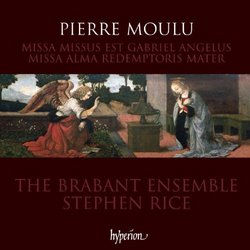| All Artists: Brabant Ensemble, Stephen Rice Title: Missa Alma redemptoris mater, Missa Missus est Gabriel angelus Members Wishing: 1 Total Copies: 0 Label: Hyperion Release Date: 5/11/2010 Album Type: Import Genre: Classical Styles: Historical Periods, Classical (c.1770-1830) Number of Discs: 1 SwapaCD Credits: 1 UPC: 034571177618 |
Search - Brabant Ensemble, Stephen Rice :: Missa Alma redemptoris mater, Missa Missus est Gabriel angelus
 | Brabant Ensemble, Stephen Rice Missa Alma redemptoris mater, Missa Missus est Gabriel angelus Genre: Classical
|
Larger Image |
CD Details |
CD ReviewsPierre Who (?1484 - circa 1550) Giordano Bruno | Wherever I am, I am. | 06/02/2010 (5 out of 5 stars) "That more or less summarizes our knowledge of Pierre Moulu the man. It's probable that he was French, it's possible that he was associated with various Parisian composers, it's a wild guess that he was a cleric in the diocese of Meaux, but it's certain that he was known to the celebrated composer Jean Mouton, since Mouton included examples of Moulu's work in The Medici Codex of 1518. In fact, some twenty motets, ten chansons and five masses of Moulu's have survived in various manuscripts and printed sources. You'll find his music, especially the motet 'Mater floreat' included on various CDs of Renaissance polyphony, but this is the first CD devoted entirely to him. And it's a fine one! Like a baseball rookie who hits a home run in his first at bat, Pierre Moulu is batting 1000!
Strangely, Moulu's "Missa alma redemptoris mater" has enjoyed a kind of fame among musicologists, both in his own era and in modern times beginning in the 1870s, yet few if any of those musicologists had any occasion to HEAR it. The mass is one of the mathematical wonders of Renaissance polyphony, composed so that it can be performed two ways from the same notation. To sing it in the brief form, the choice on this CD, the singers need to omit all rests of a semibreve or longer. The full form requires the singers to heed those rests; two movements sung in that manner are also included on this CD. Like many intellectually 'challenging' compositions of the Renaissance, this mass provides a solution to the puzzle in the form of a rubric: "Tolle moras placido maneant suspiru cantu" meaning roughly "remove the rests, let the breaths stay calm". But I can assure you that no mere listener, either in 1510 or in 2010, could have perceived the mathematical manipulation in this music! There's nothing odd about the way to flows from the mouths of singers to the ears of an audience; it's a serenely lovely mass reminiscent in style of Josquin. All the skill and labor of the composition were for the 'amusement' of Moulu's fellow musicians ... and perhaps in Moulu's mind, for God, whose divine aesthetics were pleased by mathematical conundrums. Judging by the two movements sung with the rests in place, I suspect that I'd prefer the whole mass in its long form and I wish it had been sung that way on the CD. But that's my only, very minor objection to this splendid performance. The other mass recorded here - Missa Missus est Gabriel angelus - is actually more striking in its musical eloquence for the mere listener. Based on a short motet by Josquin, this mass supports the assertion that Moulu was one of Josquin's favored students. If so, the teacher had reason to be proud; the mass is worthy of the master. Though no composer of Josquin's or Moulu's era conceived his music in terms of a concert program, the disciples of Josquin 'unified' the disparate movements of the mass in such a way that their masses 'succeed' as concerts in our times. Moulu's Gabriel mass is exceptionally sweet yet builds its dramatic repetitions of short themes toward an austerely affective climax. The Brabant Ensemble has developed! This new recording is markedly more polished than any previous release from them. With women singing both the soprano and alto parts, the Brabants sound quite a lot like the Tallis Scholars at their very best. Frankly, I like their resonance more than the Tallis sound, and their ensemble technique is very clean. I haven't seen the scores of the Moulu masses, but I assume that the Brabant Ensemble, like the Tallis scholars, have transposed the music up to accommodate their women's ranges. If so, my only gripe would be that they should declare such a transposition in the notes; otherwise I'm satisfied with the results. I've begun to think that such transposition serves another purpose besides convenience for the singers; it renders this music more appealing and expressive to modern ears accustomed to baroque and romantic vocality." |

 Track Listings (15) - Disc #1
Track Listings (15) - Disc #1